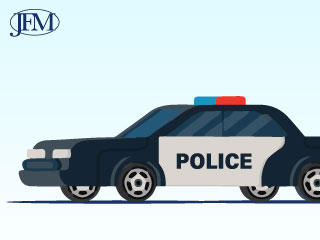 When you’re on the road, a routine traffic stop can quickly turn into a nerve-wracking experience. Whether it’s a minor traffic violation or a perceived infraction, understanding the standard of reasonable suspicion required for law enforcement to initiate a traffic stop is crucial. In the state of New Jersey, this standard plays a significant role in determining the legitimacy of such stops and ensuring that your rights are protected. Below, we go over the standard of reasonable suspicion for traffic stops in New Jersey, shedding light on what it means and its implications for drivers like you.
When you’re on the road, a routine traffic stop can quickly turn into a nerve-wracking experience. Whether it’s a minor traffic violation or a perceived infraction, understanding the standard of reasonable suspicion required for law enforcement to initiate a traffic stop is crucial. In the state of New Jersey, this standard plays a significant role in determining the legitimacy of such stops and ensuring that your rights are protected. Below, we go over the standard of reasonable suspicion for traffic stops in New Jersey, shedding light on what it means and its implications for drivers like you.
What Is Reasonable Suspicion And Its Role In Traffic Stops?
When it comes to traffic stops, reasonable suspicion serves as a pivotal legal concept. It is a standard that law enforcement officers must meet before they can initiate a traffic stop. Reasonable suspicion falls short of probable cause, which is a higher standard required for making an arrest or conducting a search. Instead, reasonable suspicion serves as a lower threshold, allowing officers to temporarily detain individuals based on a reasonable belief that they have engaged in criminal activity or violated traffic laws.
The purpose of reasonable suspicion in traffic stops is to strike a balance between ensuring public safety and protecting individual rights. It provides law enforcement officers with a limited authority to briefly detain and investigate motorists when specific and articulable facts reasonably lead them to suspect that a violation has occurred or is ongoing.
Factors Considered For Reasonable Suspicion In New Jersey Traffic Stops
 In determining whether reasonable suspicion exists for a traffic stop, law enforcement officers in New Jersey take various factors into account. These factors serve as the basis for their judgment and decision-making process. While the specifics may vary depending on the circumstances, certain common factors are often considered. Let’s explore some of the factors that can contribute to the establishment of reasonable suspicion in New Jersey traffic stops.
In determining whether reasonable suspicion exists for a traffic stop, law enforcement officers in New Jersey take various factors into account. These factors serve as the basis for their judgment and decision-making process. While the specifics may vary depending on the circumstances, certain common factors are often considered. Let’s explore some of the factors that can contribute to the establishment of reasonable suspicion in New Jersey traffic stops.
Observable Traffic Violations
One of the most straightforward factors is the observation of a traffic violation by a law enforcement officer. This can include speeding, running a red light, failure to yield, or other apparent infractions of the traffic laws.
Equipment Violations
An officer may initiate a traffic stop if they observe a vehicle with faulty equipment, such as broken taillights, non-functioning headlights, or an expired license plate.
Suspicious Behavior
Unusual or suspicious behavior exhibited by the driver or occupants of a vehicle can also contribute to reasonable suspicion. This may include nervousness, furtive movements, attempting to evade law enforcement, or other actions that raise suspicion of criminal activity.
Tips or Reports
Information provided by reliable sources, such as eyewitnesses or anonymous tips, can be a contributing factor in establishing reasonable suspicion. However, the information must be credible and specific enough to reasonably suspect that a violation has occurred.
Examples Of Reasonable Suspicion In New Jersey Traffic Stops
While each situation is unique, the following scenarios can help provide insight into when law enforcement officers may have reasonable suspicion to initiate a traffic stop in New Jersey:
Speeding
If an officer visually determines that a vehicle is exceeding the posted speed limit, they may have reasonable suspicion to initiate a traffic stop. Speeding is a common traffic violation that can lead to a lawful stop.
Erratic or Reckless Driving
Erratic driving behaviors, such as weaving in and out of lanes, tailgating, or ignoring traffic signals, can provide reasonable suspicion for a traffic stop. Such behaviors raise concerns for the safety of other motorists and may indicate impaired driving or other violations.
Equipment Violations
If an officer observes a vehicle with equipment violations, such as broken headlights, missing license plates, or tinted windows that do not comply with state regulations, they may have reasonable suspicion to conduct a traffic stop.
Visible Signs of Impairment
When an officer detects signs of impairment, such as slurred speech, bloodshot eyes, or the odor of alcohol or drugs, they may have reasonable suspicion to initiate a traffic stop to investigate potential DUI/DWI offenses.
Challenging A Traffic Stop Based On Lack Of Reasonable Suspicion
In cases where you believe that a traffic stop was initiated without reasonable suspicion, it’s crucial to understand your rights and options. If you believe your rights have been violated, you may have grounds to challenge the traffic stop in court. Here are a few key points to consider:
Consult an Attorney
It is advisable to consult an experienced traffic ticket attorney who specializes in New Jersey traffic laws. They can evaluate the details of your case, review the circumstances surrounding the traffic stop, and provide guidance on the best course of action.
Gather Evidence
Collect any evidence that may support your claim that the traffic stop lacked reasonable suspicion. This may include photographs, witness statements, or any other relevant documentation.
Legal Proceedings
Your attorney will guide you through the legal process of challenging the traffic stop, which may involve filing motions, presenting arguments, and potentially seeking the suppression of evidence obtained during the stop.
Outcome
If the court determines that the traffic stop was indeed conducted without reasonable suspicion, it may result in the suppression of evidence obtained during the stop. This can significantly impact the prosecution’s case against you.
The Importance Of Consulting An Experienced Traffic Ticket Attorney
Navigating New Jersey’s traffic laws and legal proceedings can be complex and overwhelming. That’s why it’s crucial to seek the assistance of an experienced traffic ticket attorney, such as the Law Offices of Jonathan F. Marshall. Here’s why their expertise can make a difference:
In-depth Knowledge
Traffic ticket attorneys specializing in New Jersey law possess a comprehensive understanding of the state’s motor vehicle statutes, including the standard of reasonable suspicion for traffic stops.
Case Evaluation
They can review the specific details of your case, analyze the circumstances surrounding the traffic stop, and determine the viability of challenging the stop based on lack of reasonable suspicion.
Legal Strategy
Traffic ticket attorneys will develop a tailored legal strategy based on the unique aspects of your case. They will guide you through the legal process, advocate for your rights, and work towards the best possible outcome.
Court Representation
Should your case proceed to court, a skilled attorney will provide competent representation, presenting arguments, cross-examining witnesses, and advocating on your behalf.
New Jersey Criminal Defense Lawyers:
If you have received a traffic ticket in New Jersey and believe that the traffic stop lacked reasonable suspicion, we encourage you to contact The Law Offices of Jonathan F. Marshall for sound legal advice and representation. Our former prosecutors & accomplished NJ traffic ticket attorneys have over 200 years of combined experience to put into action. Contact our law office at (855) 966-4931 for an immediate free telephone consultation or to schedule an office meeting.
